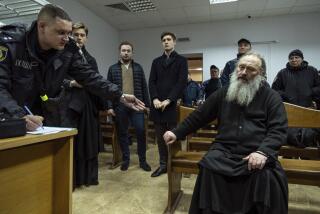Controversial Ukraine Prelate Defrocked : Schism: Decision to punish head of Russian Orthodox branch could deepen conflict between elders and members.
- Share via
MOSCOW — Bishops of the Russian Orthodox Church announced Friday that they have defrocked the controversial head of their Ukrainian branch, accusing him of “slander and blackmail.”
The drastic decision by the synod, meeting at Moscow’s 13th-Century Danilovsky Monastery, threatens to deepen a schism between the central church and its rebellious Ukrainian see.
And it adds another dramatic chapter to the biggest scandal in years to afflict the Russian Orthodox Church, which has an estimated 50 million members and last witnessed such a critical church trial more than three centuries ago.
The defrocked prelate, Filaret, the Metropolitan of Kiev and All Ukraine, will be “deprived of all his clerical degrees and all rights linked to his status as a clergyman,” Filaret’s elected successor, Vladimir, said.
“Filaret is blamed for his cruel and supercilious attitude toward the subordinate priesthood, for dictatorship and blackmail, for public abuse and slander about the synod and for perjuries and unlawful reappointments of bishops,” the Interfax news agency reported.
Although the bishops made a point of denying that Filaret’s punishment would affect the push for independence by the Ukrainian branch of the church, it appeared that Filaret’s battle with church elders was nonetheless supremely political.
In the same way that Ukraine is seeking to throw off Moscow’s traditional domination, Filaret launched a battle to bring independence to the Ukrainian branch of the Russian Orthodox Church. The branch has been subordinated to Moscow since the 17th Century.
Church leaders in Moscow have given the Ukrainian branch more freedom but have stopped short of awarding it full independence. Because Russia’s 1,000-year history of Christianity began in Kiev, in the proto-Russian state known as Rus, it is emotionally difficult for church elders to let Kiev and its rich heritage slip from their grasp.
But Filaret’s push for independence fits well with the current political atmosphere in Ukraine, and it has put him in a better position to compete with the resurgent Ukrainian Catholic Church.
Further complicating the ecclesiastical battle, Ukrainian President Leonid M. Kravchuk has come down strongly on Filaret’s side and has refused to recognize Vladimir as the new Metropolitan of Ukraine.
Vladimir said Friday that he did not know whether he could occupy his official residence in Kiev because Ukrainian special forces--loyal to Kravchuk and thus to Filaret--are guarding it.
Under pressure from the elders in Moscow, Filaret had vowed to resign in April, but he then reneged, saying, “I am answerable to God for the Ukrainian Orthodox Church.” By going back on his word, the synod said, he “committed the crime of breaking his oath, which involves expulsion from the clergy.”
Some of the synod’s charges against him, including those of reshuffling bishops and acting “superciliously,” appeared to stem from his decision to remove three bishops from office earlier this year when they protested his decision to declare the Ukrainian church autonomous.
Opponents also accuse Filaret of informing for the KGB, the old Soviet secret police, and of violating his vow of chastity. He “tempted believers by his behavior and private life,” the synod complained.
More to Read
Sign up for Essential California
The most important California stories and recommendations in your inbox every morning.
You may occasionally receive promotional content from the Los Angeles Times.













